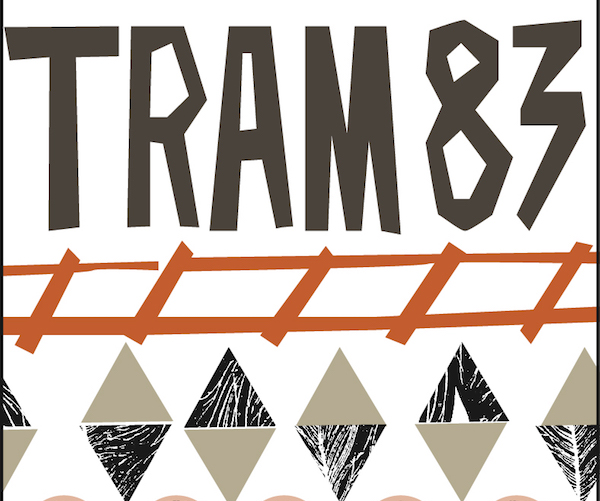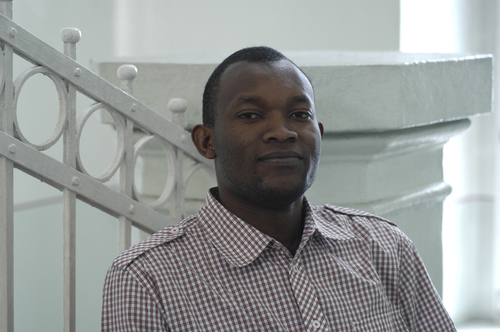Book Review: The Blissful “Botched-Night Splendor” of Tram 83
By John Taylor
Tram 83 mirrors the most sordid and chaotic features of contemporary African cities, in which non-Africans also remain intimately and often deviously involved. Nothing angelic crops up in this believable dystopia.
Tram 83 by Fiston Mwanza Mujila, translated from the French by Roland Glasser, Deep Vellum, 196 pp., $14.95.

In the publicity information provided on the back cover of my Special Advance Reader’s Copy of Tram 83, the Congolese writer Fiston Mwanza Mujila (b. 1981) is compared to “Céline, Boris Vian, Hunter S. Thompson, Aimé Césaire, Burroughs, Alain Mabanckou, Beckett [and] Henry Miller,” whereas — catch your breath—he is said to have “very little in common with recent African contemporary writers such as Teju Cole, Adichie, Selasi [and] Bulowayo.” It is subsequently stated that he “wants to do with literature what John Coltraine and his album Giant Steps did for jazz—to go beyond music. Tram 83 goes beyond literature.”
May I briefly protest about this way of introducing a young (or even an old) author — this is Mujila’s first novel — with a flurry of names, some of which are misleading? (Can Mujila truly be linked up, stylistically and thematically, to Beckett, Vian, even Césaire?) And is it reasonable to claim that such an, albeit, mind-boggling, essentially realistic novel goes “beyond literature”? Come to think of it, does the mind-boggling, essentially unrealistic novel Finnegans Wake go beyond literature?
As it is, through Roland Glasser’s lively translation, Mujila tells a dynamic, sometimes scabrous, sometimes satirical story with political and economic underpinnings. Since the novelist hails from Lubumbashi, one of the big cities of the Democratic Republic of the Congo, the turbulent unnamed town at the heart of the tale might well be modeled on his own hometown. Or perhaps “Tram 83”, the restaurant-nightclub-hooker-bar around which the novel revolves, is imaginatively located in Kinsasha, the capital. Or, conceivably, in some distorted reflection of Kinsasha or Lubumbasi that would lie, fictionally, outside of the Democratic Republic …
Be the fact and fiction as they may, Mujila surely keeps in mind the realities, and vulnerabilities, of his homeland, known for its political instability and plentiful raw minerals. In a few passages, Congo-Zaire (an earlier name for the country) and Patrice Lumumba (1925-1961), the assassinated first prime minister of the Democratic Republic, are even mentioned — though in contexts not necessarily implying that Congo-Zaire is the land of the novel. Because Mujila is intentionally unspecific about place names, the story could have taken place in any African country beset with civil wars, coups d’état, moral depravity, economic corruption, and the nefarious exploitation of natural resources. The fiction mirrors the most sordid and chaotic features of contemporary African cities, in which non-Africans also remain intimately and often deviously involved. Nothing angelic crops up in this believable dystopia.
In Tram 83, the fictional town has become a “City-State” in secession. Just as soon, “a stone rush [breaks] out in the region occupied by the rebels.” By “stone” is indeed meant the mineral richness of the country. Both locals and foreigners are lured by the prospect of sudden wealth. Many in fact sneak into the forbidden mines, risking their lives by digging in dangerous tunnels and then lugging out sacks of rocks that might contain a profitable gem. At night, everyone gathers in the sleazy Tram 83 nightclub, a haven for gangsters, “single-mamas,” underage prostitutes called “baby-chicks,” students, office workers, Pentecostal preachers, jugglers, gangsters, ex-convicts, mercenaries, and sundry desperados. The atmosphere, rife with debauchery and “botched-night splendor,” is sweetened by jazz, especially by the songs of a woman called the Railroad Diva. Jazz is, indeed, the common denominator of the disparate habitués and their respective social classes.

Author Fiston Mwanza Mujila — He keeps in mind the realities, and vulnerabilities, of his homeland, known for its political instability and plentiful raw minerals. Photo: Fiston Mwanza
Consorting with these colorful figures are the two main characters, Requiem and Lucien. They are childhood friends who, ever since Lucien has come home on a visit from Europe, have been living together in Vampiretown, a bourgeois neighborhood. “The first Europeans to settle here,” explains Mujila, “died from the effects […] of the dodgy sanitary and weather conditions.” Note bene: Although I’ve placed a bracketed ellipsis in this quotation for temporary clarity, Mujila actually inserts, instead, this characteristic brief dialogue:
“You guys live alone?”
“Yes!”
“We give good head.”
The novel is full of such interjections, as the ‘baby-chicks’ interrupt the narrative and try to hook new customers. These theatrical asides give the plot, literally, a kind of intermittent eruptivity.
Besides other probable racial origins, Requiem bears the “blood of a Russian ship owner come to seek his fortune in the scorching tropics.” He intends to take control of the local underworld. The nightclub is, of course, the ideal place to carry out his schemes. Lucien is an aspiring playwright. He encounters his potential publisher in the dive, a man named Ferdinand Malingeau, director of Joy Train Publications. At once accepting and rejecting Lucien’s manuscript, Malingeau keeps him on the hook by telling him to revise it in various ways, finally suggesting that he completely change the subject matter: “My proposition is that you resubmit this same text to me but with the action taking place in Colombia . . . FARC, the jungle, you see what I mean.” Their burlesque conversations both satirize and underscore the dilemma of an African writer struggling to get his first manuscript published in Europe. Arguably, Tram 83 is Lucien’s own creation, as if he had written a novel chronicling how he had been drafting and trying to publish a play. In this sense, the book is surely also informed by personal elements. Mujila is a playwright and two of his plays, Et les moustiques sont des fruits à pépins and Te voir dressé sur tes deux pattes ne fait que mettre de l’huile au feu, have in fact just been published in Belgium by the Éditions Lansman.
“There are cities which don’t need literature,” the author asserts, “they are literature. They file past, chest thrust out, head on their shoulders. They are proud and full of confidence despite the garbage bags they cart around.” Mujila’s transcription of the “City State” is, literally, stunning, even as one must feel stunned when sitting amid the jazzy uproar and underhand dealings of the seedy nightclub. How can so much sordidness, aggressiveness, and disastrous human interaction be so captivating — and sometimes amusing? This is an additional question that the reader may wish to ponder. In any event, declares the novelist: “If bliss had a name, it would be called Tram 83.”
John Taylor has recently published his translation of Lorenzo Calogero’s poetry, An Orchid Shining in the Hand (Chelsea Editions), for which he received the 2013 Raiziss-de Palchi Translation Fellowship from the Academy of American Poets. He is the author of the three-volume essay collection, Paths to Contemporary French Literature (Transaction Publishers). His most recent books of poetry and short prose are The Apocalypse Tapestries (Xenos Books) and If Night is Falling (Bitter Oleander Press).
Tagged: Deep Vellum, Democratic Republic of the Congo, Fiston Mwanza Mujila, french, Roland Glasser, Tram 83
